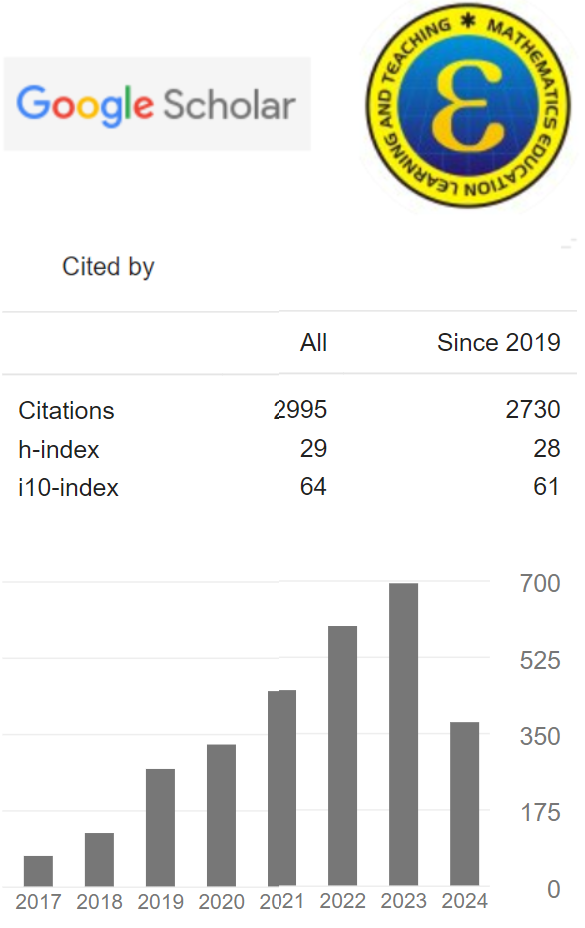Model-Eliciting Activities (MEAs) Approach to Mathematical Problem Solving Ability at MA DDI Alliritengae
(1) Universitas Muslim Maros
(2) Universitas Muslim Maros
(3) Universitas Muslim Maros
(4) Muslim University of Maros
(*) Corresponding Author
Abstract
This experimental research aims to assess the impact of the Model-Eliciting Activity (MEAs) learning approach on the mathematical problem-solving abilities of class XI students at MA DDI Alliritengae. Utilizing a quasi-experimental method with a Non-Equivalent Control Group Design, the study involved pre-test and post-test evaluations of both control and experimental groups. Simple Random Sampling was employed for sample selection. The research revealed that, initially, students in both groups exhibited low mathematical problem-solving abilities. Post-test results indicated that while the control group showed only minor improvements, remaining mostly at low or medium criteria, the experimental group demonstrated significant improvements, with most indicators reaching a high category. Hypothesis testing yielded a sig. (2-tailed) value of 0.000, indicating a significant effect of the MEAs approach on students' mathematical problem-solving skills. Thus, the study concludes that the MEAs approach effectively enhances mathematical problem-solving abilities, outperforming traditional lecture methods
Keywords
Full Text:
PDFReferences
Amalia, Y., Duskri, M., and Ahmad, A. (2015). Penerapan model eliciting activities untuk meningkatkan kemampuan berpikir kreatif matematis dan self confidence siswa sma. Jurnal Didaktik Matematika, 2(2). Retrieved from https://jurnal.usk.ac.id/DM/article/view/2848/2711
Atieka, TA, & Budiana, I (2019). Pengaruh Modeleliciting Activities(Mea’s) Terhadap Kemampuan Pemecahan Masalah Matematis Dan Self Confidencesiswa, JPM: Jurnal Pendidikan Matematika 5(2). 95–104. https://doi.org/10.33474/jpm.v5i2.2956
Davita, P. W. C., & Pujiastuti, H. (2020). Analysisis of mathematical problem solving ability in terms of gender. Kreano, Journal of Creative-Innovative Mathematics, 11(1). https://doi.org/10.15294/kreano.v11i1.23601. 110-117
Ferdiani, R. D. (2017). Application of model eliciting activities (MEAS) approach to improve understanding of junior high school mathematics concepts. Math Didactic: Journal of Mathematics Education, 3(3). https://doi.org/10.33654/math.v3i3.129. 216-223
Hermawati, H., Jumroh, J., &; Sari, E. F. P. (2021). Analysis of Mathematical Problem Solving Skills on Cube and Block Materials in Junior High School. Mosharafa: Journal of Mathematics Education, 10(1). https://doi.org/10.31980/mosharafa.v10i1.874. 141-152
Illahi, K., Pujiastuti, H., &; Samsuri, S. (2019). The effect of model eliciting activities (MEAs) approach on students' critical thinking skills and mathematical disposition. Journal of Math Educator Nusantara: Wahana for Publication of Scientific Papers in the Field of Mathematics Education, 5(2). https://doi.org/10.29407/jmen.v5i2.12891. 190-197.
Isnani, T., & Handoko, H. (2023). Analysis of Students' Mathematical Literacy Ability in Solving Mathematical Problems in View of Logical Intelligence. Educational Insights, 1(2), 41-57. https://doi.org/10.58557/eduinsights.v1i2.9
Izzati, N. (2009, December). Berpikir Kreatif dan Kemampuan Pemecahan Masalah Matematis: Apa, Mengapa, dan Bagaimana Mengembangkannya Pada Peserta Didik. In Prosiding Seminar Nasional Matematika dan Pendidikan Matematika, Bandung (Vol. 19, pp. 49-60).
Muktia, A. (2018). The Effect of the Application of Model Eliciting Activities (MEAs) on Student Learning Activities and Mathematical Problem Solving Ability Class VIII MTSN 9 Padang Pariaman. Thesis. 1-89.
Nasir, A. M. (2016). Education Statistics. Yogyakarta: Media Academy.
Nasir, A. M. (2018). SPSS Training Module. Workshop on Preparation of Research Results.
Rusliah, N., Handican, R., Deswita, R., & Oktafia, M. (2021, February). Mathematical problem-solving skills on relation and function through Model-Eliciting Activities (MEAs). In Journal of Physics: Conference Series (Vol. 1778, No. 1, p. 012016). IOP Publishing. https://doi.org/10.1088/1742-6596/1778/1/012016
Siagian, M. D. (2016). Kemampuan koneksi matematik dalam pembelajaran matematika. MES: Journal of Mathematics Education and Science, 2(1). 58–67. https://doi.org/10.30743/mes.v2i1.117
Sriwahyuni, K., &; Maryati, I. (2022). Students' Mathematical Problem Solving Skills on Statistical Material. Plusminus: Journal of Mathematics Education, 2(2). https://doi.org/10.31980/plusminus.v2i2.1830. 335-344
Sugiono, M. D. (2015). Comprehensive Action Research Methods. Bandung: Alfabeta Bandung.
Usman, M. R. (2016). Pembelajaran inkuiri model alberta untuk meningkatkan kemampuan berpikir kreatif matematis siswa smp. Delta-Pi: Jurnal Matematika dan Pendidikan Matematika, 3(2). https://doi.org/10.33387/dpi.v3i2.139
DOI: 10.24235/eduma.v13i1.15083
Article Metrics
Abstract view : 53 timesPDF - 10 times
Refbacks
- There are currently no refbacks.
Copyright (c) 2024 EduMa: Mathematics education learning and teachingâ€â€â€Ž


.png)










